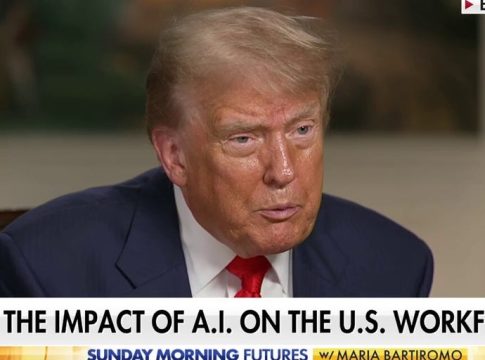America’s Leadership in AI: A New Frontier in Technology
In the rapidly evolving landscape of artificial intelligence (AI), former President Donald Trump has come forward with bold assertions about America’s dominant position in the global tech arena. His claims focus on the strides made in AI development, positioning the United States as a leader in what many consider the next industrial revolution.
The Current State of AI in the U.S.
Trump’s remarks come at a time when AI technologies are becoming increasingly integral to various sectors, from healthcare to finance and beyond. With companies like Google, Microsoft, and OpenAI at the forefront, significant advancements in machine learning and natural language processing are redefining how businesses operate and engage with consumers.
Recent trends illustrate the rapid acceleration of AI capabilities, driven by enhanced computational power and vast datasets. The U.S. has made pioneering contributions, especially in developing large language models that can understand and generate human-like text. This has not only implications for tech sectors but is reshaping our daily interactions with digital platforms.
Key Players and Competitive Edge
The competitive edge that Trump refers to can be traced back to a combination of innovative research institutions, substantial venture capital investment, and a workforce skilled in data science and AI engineering. Silicon Valley serves as a prime example where creativity and funding converge to push the boundaries of what AI can achieve.
Additionally, government initiatives aimed at stimulating AI development and ensuring ethical standards have played a crucial role. Agencies have begun exploring regulations to safeguard against biases in AI systems, ensuring that advancements benefit all sectors of society rather than just a select few.
Societal Implications: Growth vs. Caution
As AI technology continues to flourish, it brings both opportunities and challenges. On one hand, businesses are leveraging AI to improve efficiencies and customer experience, leading to economic growth and job creation in tech-driven sectors. On the other hand, ethical concerns about data privacy, algorithmic bias, and the potential for job displacement loom large.
To illustrate, industries traditionally reliant on human expertise—such as customer service, legal advice, and even creative fields—are now seeing AI systems stepping in to perform tasks previously thought to require a human touch. This juxtaposition raises important questions about the future of work and the role of humans in an increasingly automated world.
Looking Ahead: The Future of AI
In light of these developments, America’s stance as a leader in AI raises critical discussions about maintaining that edge. Continuous investment in education and infrastructure, alongside collaborative efforts between tech companies and government entities, will be vital to preserving this leadership position.
Moving forward, the challenge will be to harness AI’s potential while navigating the accompanying ethical landscapes it creates. As the dialogue around AI evolves, it is essential for technologists, lawmakers, and society at large to engage in a balanced discourse about how to shape AI development responsibly.
In summary, while the U.S. has made considerable advancements in AI, the continued trajectory of this technology will depend on careful management of both its benefits and risks. As the conversation around AI continues, one thing remains clear: America is at the forefront of a technology that is set to redefine the 21st century.

Writes about personal finance, side hustles, gadgets, and tech innovation.
Bio: Priya specializes in making complex financial and tech topics easy to digest, with experience in fintech and consumer reviews.

